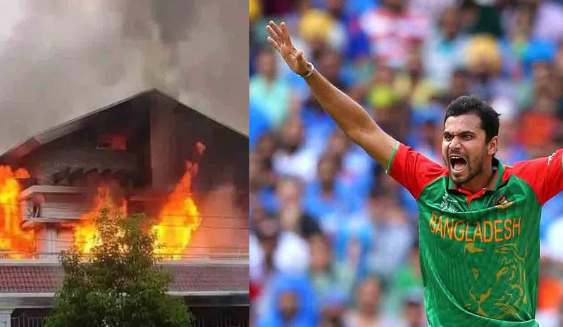Introduction
In a dramatic turn of events, protesters set fire to the house of former Bangladesh cricket captain and current Member of Parliament, Mashrafe Bin Mortaza, following the resignation and departure of Prime Minister Sheikh Hasina. This incident is part of the larger wave of violence and chaos sweeping through Bangladesh, reflecting the deep political unrest gripping the nation.

Mashrafe Mortaza : From Cricket Star to Politician
Mashrafe Bin Mortaza, widely regarded as one of Bangladesh’s greatest cricketers, transitioned from a celebrated sports career to a significant political role. Born on October 5, 1983, in Narail, Khulna division, Mortaza’s cricket career spanned over a decade, during which he led the national team in 117 matches across all formats. His achievements on the field include taking 390 international wickets and scoring 2,955 runs in 36 Tests, 220 ODIs, and 54 T20Is.
In 2018, Mashrafe Mortaza entered politics by joining the Awami League, led by Sheikh Hasina. He successfully contested the Narail-2 constituency in the general elections, becoming a Member of Parliament. His popularity and clean image made him a significant figure in the political landscape of Bangladesh.
Political Turmoil and Hasina’s Departure
The political situation in Bangladesh took a dramatic turn when Prime Minister Sheikh Hasina resigned and left the country amid massive student protests. Reports indicate that Hasina’s sudden departure was precipitated by mounting pressure and unrest, which had been escalating over several weeks. According to local media, the protests were driven by demands for greater transparency, democratic reforms, and an end to corruption.
As Hasina left for London, the country was plunged into chaos. The protests intensified, and the frustration of the demonstrators boiled over into acts of violence. One of the most shocking incidents was the attack on Mashrafe Mortaza’s residence. Protesters vandalized and set fire to his house, an act that underscored the depth of the anger and discontent among the populace.
Violence and Vandalism Spread
The violence was not limited to Mashrafe Mortaza’s home. The District Awami League office was also set ablaze, and the house of its President, Subash Chandra Bose, was vandalized. These incidents highlight the widespread nature of the unrest and the targeting of political figures associated with the ruling party.
The Dhaka Tribune reported that the Ganabhaban, the official residence of the Prime Minister, was also vandalized by thousands of protesters. This wave of violence is a stark reminder of the volatile political environment in Bangladesh and the severe backlash against the current political leadership.
Expert Opinions on the Crisis
Dr. Ali Riaz, a renowned political analyst, stated, “The resignation of Sheikh Hasina and the subsequent violence are indicative of deep-seated issues within Bangladesh’s political system. The demands for democratic reforms and the end to corruption are not new, but the government’s inability to address these issues has led to this explosive situation.”
Another expert, Dr. Iftekharuzzaman, Executive Director of Transparency International Bangladesh, remarked, “The public’s frustration with corruption and lack of transparency in the government has reached a boiling point. The targeting of prominent figures like Mashrafe Mortaza, who was previously viewed positively, shows the extent of the anger and the desire for significant change.”
The Impact on Bangladesh’s Future
The immediate impact of these events is the destabilization of Bangladesh’s political landscape. The resignation of Sheikh Hasina, a long-standing political leader, leaves a power vacuum that could lead to further instability. The violence and chaos also have broader implications for the country’s international image and economic stability.
The business community has expressed concerns over the potential economic fallout from the ongoing unrest. Foreign investments may be at risk, and the overall economic growth could be hampered if the situation does not stabilize soon.
Timeline of Key Events
- October 5, 1983: Birth of Mashrafe Bin Mortaza
- 2018: Mortaza enters politics, joins Awami League
- 2023: Mortaza wins Narail-2 constituency for the second time
- August 5, 2024: Sheikh Hasina resigns and leaves Bangladesh
- August 6, 2024: Protesters set fire to Mashrafe Bin Mortaza’s house
Conclusion: Reflecting on a Nation in Turmoil
Bangladesh is at a critical juncture in its political history. The events following Sheikh Hasina’s resignation have exposed the deep divisions and frustrations within the country. As the nation grapples with these challenges, the need for a peaceful resolution and meaningful reforms is more urgent than ever. The path forward will require strong leadership, transparent governance, and a commitment to addressing the grievances of the people.
References and Sources
- “Mashrafe Mortaza: From Cricket Captain to Politician,” The Daily Star
- “Bangladesh’s Political Crisis: A Closer Look,” Al Jazeera
- “Sheikh Hasina’s Resignation and Its Aftermath,” BBC News
- “Transparency and Governance in Bangladesh,” Transparency International
- “The Dhaka Tribune’s Coverage of the Protests”
For Regular News and Updates Follow – Sentinel eGazette
FAQs:
Q1: Why did the protests in Bangladesh escalate?
A1: The protests escalated due to the resignation of Prime Minister Sheikh Hasina, which sparked widespread anger and demands for democratic reforms and an end to corruption.
Q2: What role did Mashrafe Mortaza play in the Awami League?
A2: Mashrafe Mortaza is a Member of Parliament representing the Narail-2 constituency as part of the Awami League. He joined the party in 2018 after retiring from international cricket.
Q3: What were the main demands of the student protesters in Bangladesh?
A3: The student protesters in Bangladesh were demanding greater transparency, democratic reforms, and an end to corruption within the government.
Q4: How did the international community react to Sheikh Hasina’s resignation?
A4: The international community expressed concern over the violence and instability following Sheikh Hasina’s resignation and called for a peaceful resolution and adherence to democratic principles.
Q5: What impact does the unrest have on Bangladesh’s economy?
A5: The ongoing unrest could lead to a decline in foreign investments and negatively impact Bangladesh’s overall economic growth if the situation remains unresolved.